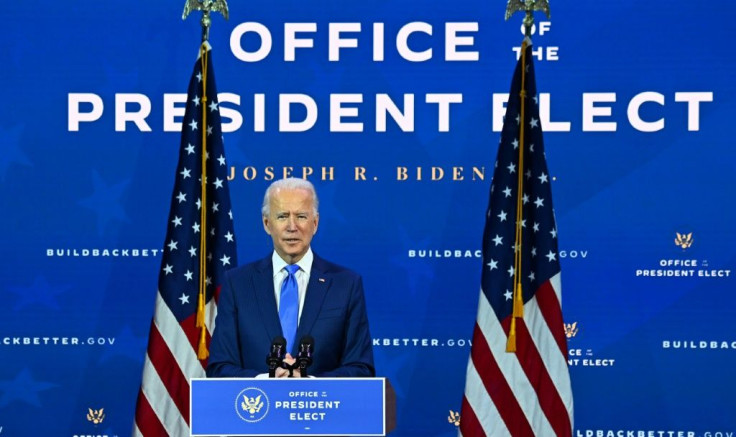Biden Says His Policy On China Less Punitive Than Trump's Approach
KEY POINTS
- Biden says his policy on China is less punitive than his predecessor's approach
- His comments follow more blacklisting from the Trump administration
- Harris, for her part, was less willing to be pinned down on a policy statement
President-elect Joe Biden said his policy toward China would be less about punishment and more about convincing the Communist country to adhere to international norms.
In their first joint interview since the Nov. 3 election, Biden and Vice President-elect Kamala Harris told CNN’s Jake Tapper on Thursday they would take a decidedly different approach to China than President Donald Trump's punitive policies.
“It's not about punishing them for COVID virus; it's about insisting that there be international norms that are established that they play by,” Biden said.
Since clinching the win in the presidential contest, Biden has put forward a policy of international engagement, seeking to return the U.S. to multilateral agreements such as the Paris climate accords and potentially the deal that saw Iran back away from some of its nuclear ambitions.
After the global pandemic erupted from an outbreak in China’s Wuhan province, Trump has labelled COVID-19 the “Chinese virus,” taking a punitive approach to his policy toward one of the top superpowers in the world.
Biden's comments follow an op-ed in The Wall Street Journal from John Ratcliffe, Trump’s director of national intelligence, who argued that “Beijing intends to dominate the U.S. and the rest of the planet economically, militarily and technologically.”
The Trump administration heaped on the pressure Thursday by adding Chinese chipmaker SMIC and state oil company CNOOC to a blacklist alleging ties to the Chinese military. Trump’s policies on China, Biden said, are “backwards.”
This is the second time this week Biden has articulated his approach to a potential détente with China. In an interview this week with the New York Times, Biden said he would work with U.S. allies on adopting a less solitary approach to China.
“The best China strategy, I think, is one which gets every one of our — or at least what used to be our — allies on the same page,” he said. “It’s going to be a major priority for me in the opening weeks of my presidency to try to get us back on the same page with our allies.”
Many of Trump’s policies, such as leaving the Paris agreement and disengaging from the World Health Organization during the pandemic, have been criticized as isolationist, leaving the U.S., more or less, alone in the world.
Harris, for her part, was less willing to lay out a definitive policy statement on China.
“We are not in a position of stating policy about our relationship with any of these countries at this moment,” she said.

© Copyright IBTimes 2024. All rights reserved.




















